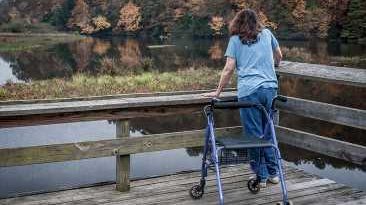Risk of brain condition linked to dementia grows with every year of rugby play
Rugby Union: Thompson wants dementia action
Rugby players’ risk of the degenerative brain condition CTE increases by 14 percent for every year of their career, a study suggests.
The disease, which leads to dementia, has been linked to repeated head injuries sustained during contact sports.
A research team led by the University of Glasgow performed postmortem examinations of the brains of 31 former amateur and elite rugby union players in the UK, US and Australia. Evidence of CTE was found in 68 percent.
Study leader Professor Willie Stewart, a consultant neuropathologist, said: “Our data show risk is linked to length of rugby career, with every extra year of play increasing risk.
“Based on this it is imperative that the sport’s regulators reduce exposure to repeated head impacts in match play and in training to reduce risk of this otherwise preventable contact sport related neurodegenerative disease.”

Concerns have grown in recent years over the link between dementia and head injuries during sports such as rugby, football, boxing and wrestling.
Hundreds of rugby players represented by London-based law firm Rylands Garth are taking legal action against the sport’s governing bodies after sustaining brain injuries.
A statement on the law firm’s website says: “We contend that the governing bodies of those sports were negligent in failing to protect their players from concussions and sub-concussions, as well as fully highlighting to those players the full extent of the risks.”
Former England players Steve Thompson, 45, and Michael Lipman, 43, are among those taking legal action after being diagnosed with early onset dementia and probable CTE.
Steve has revealed he realised something may be wrong when he watched a replay of England’s 2003 Rugby World Cup win and could not remember the match.
He said: “There was no recall of what had gone on and suddenly I started to think about periods of my life that had just disappeared.”
Don’t miss…
Doctor’s warning as dementia linked to common health issue 6 million Brits have[LATEST]
Five symptoms of a common vitamin deficiency that could be mistaken for dementia[LATEST]
Angela Rippon ‘hopes she’d be honest’ if she spotted dementia signs[LATEST]

The players who donated their brains for the research had an average career length of 18 years. Three quarters had played as amateurs, while the rest reached an elite level.
Their position and level did not appear to influence their risk of CTE.
Dr Ann McKee, director of the Boston University CTE Center and UNITE brain bank, said: “CTE is a preventable disease.
“There is an urgent need to reduce not only the number of head impacts, but the strength of those impacts, in rugby as well as the other contact sports, in order to protect and prevent CTE in these players.”
Professor Michael Buckland, director of the Australian Sports Brain Bank, said a recent government inquiry had also found “clear evidence of a causal link between repeated head trauma and concussions and subsequent neurodegenerative disease such as CTE”.
He added: “Sports regulators need to develop and implement CTE risk minimisation protocols as a matter of urgency.”
The findings were published in the journal Acta Neuropathologica.
- Advert-free experience without interruptions.
- Rocket-fast speedy loading pages.
- Exclusive & Unlimited access to all our content.

Source: Read Full Article



